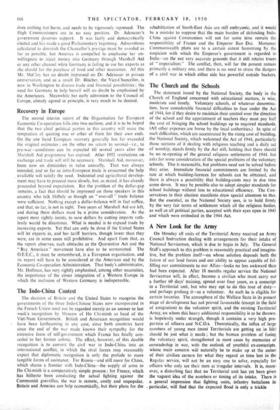The Church and the Schools
The statement issued by the National Society, the body in the Church of England concerned with educational matters, is wise, moderate and timely. Voluntary schools, of whatever denomina- tion, have considerable financial difficulties to face under the Act of 1944, for if they desire to maintain their control over the direction of the school and the appointment of teachers they must pay half the cost of bringing the school buildings up to required standards. (All other expenses are borne by the local authorities.) In spite of such difficulties, which are accentuated by the rising cost of building, the National Society, which welcomed the Act of 1944, particularly those sections of it dealing with religious teaching and a daily act of worship, stands firmly by the Act still, holding that there should be no re-opening of the general religious settlements of 1944. but asks for some consideration of the special problems of the voluntary schools. This is reasonable, but problems need not be solved before they arise. Immediate financial commitments are limited by the rate at which building-licences for schools can be obtained, and there is always a possibility that building-costs may in due time come down. It may be possible also to adopt simpler standards for school buildings without loss to educational efficiency. The Con- servatives in their election manifesto draw special attention to this. But the essential, as the National Society sees, is to hold firmly by the very fair terms of settlement which all the religious bodies, as well as all political parties, accepted with their eyes open in 1943 and which were embodied in the 1944 Act.


































 Previous page
Previous page